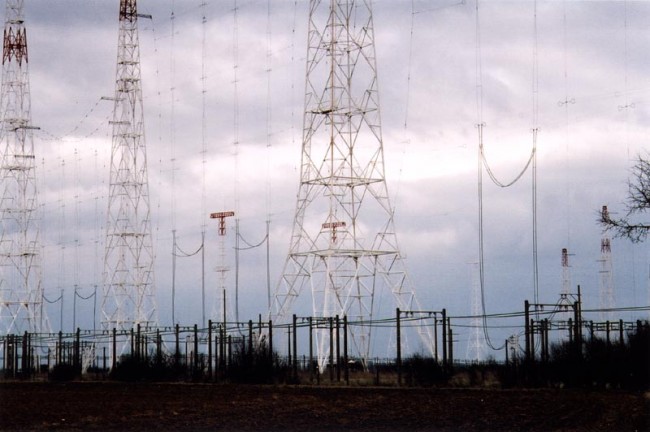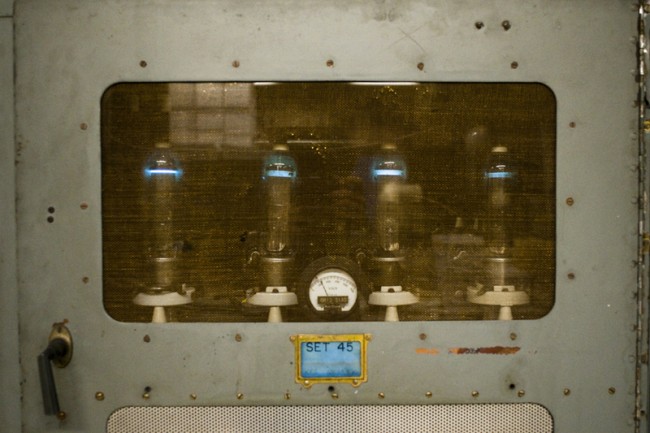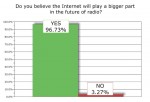Here’s a secret to all those broadcasters that think streaming online is the answer to all the world’s problems: It isn’t all that. I used to like listening to Radio Netherlands (Radio Nederland) on the shortwave. They have some excellent programs like The State We’re In. One problem, the only way to get it these days here in the US is via Webstream.
The same for many other world broadcasters like the BBC, CBC, HCJB, et. al. Most of these former big shortwave broadcasters have greatly reduced their operating hours or left the airwaves all together.

Streaming content on the world wide web is not broadcasting, nor can the quality and reliability be compared. Web streaming is far less reliable and offers lower quality than does HF broadcasting. The former broadcasters who have abandoned the airwaves to the likes of Radio China International will say otherwise, but that is their spin on the situation. Of course, using and maintaining high-powered broadcast transmitters is expensive, especially for governments that are faced with tough financial decisions.
First and foremost, streaming requires that I use my computer as a radio while I am trying to do other things on it. I bit of background on my computer; I have an 8-year-old Dell Inspiron 5150 that I purchased when I was working on my degree. When I got it, I asked our IT department guys what was the best course for buying a new computer. Their answer was to get the best, fastest processor available because everything else can be replaced/upgraded. I did just that, with a 3.06 GHz intel mobile P4. I have replaced the hard drive with a 200 GB unit and upgraded the RAM to 2.2 GB. The keys have most of the letters worn off, it has very distinctive wear marks on the case where I place my hands, etc. It has lived up to my expectations for serviceability and then some.
Even so, it does have its limitations. Listening to streaming audio of watching streaming video is not one of its strong points, especially when engaged in other tasks. Often, when listening to streaming, there are dropouts and other interruptions and the audio just doesn’t sound great coming from the computer speakers. Even external speakers leave something to be desired, quality-wise. Something about the digitized sliced and diced bit reduced stream that I find annoying and worse yet, fatiguing.
We live out in the sticks. Our local phone company, in spite of being the largest dial tone provider in the nation, has some reliability issues when it comes to their DSL service. Several times, the DSL goes out for no apparent reason, returning several hours or days later without comment from TELCO. If you call in an outage, they always act like they never heard of the problem.
Listening to my shortwave receivers offers better reliability and quality than streamed audio. I know I am not alone in this regard as several others have made the same comments. Listening to shortwave is listening to real radio, listening to tinny-thin audio over a computer or smartphone is crap.
There is an ever-dwindling selection of English shortwave broadcasters listenable in North America. Nature, as is said, abhors a vacuum. Therefore, income the religious broadcasters, false prophets, anti-government crackpots, hucksters, other governments with money like China and Russia, pirates, and others to fill the void. That is all well and good I suppose, but I do miss that day that I could get BBC news at the top of the hour on 15400 KHz.






I really miss Radio Canada International. Nowadays there isn’t too much in English besides preachers and the Chinese. I listen to WBCQ for a few of their non-religious programs, but the pickings are pretty thin out there. Even the BBC has abandoned us! Nevertheless I went out and purchased a new Grundig G3 a few weeks ago to replace my aging and well-worn Sony ICF 2010. Even though I listen to podcasts and other online stuff, there’s nothing like tuning in a distant station over the air. Radio makes the world seem wonderfully big. The internet makes it seem awfully small.
Just think how much electrical energy the world is saving by turning off the Filament and Plate switches of these monster transmitters! And then there is Google with worldwide server farms that continuously suck power in the megawatts 24 hours daily! After watching technology as an engineer over the years, it has become apparent that sometimes the latest isn’t always the greatest. And with everyone seemingly taking an I-Phone to bed with them, and new big government “performance taxes” for the music industry to line their pockets, wireless broadcasters are slowly being phased out of existence. GE used to have a slogan; “Progress is our Most Important Product”; but is it????
It is important to keep analog broadcasts on all bands. The technology is simple for the listener, and doesn’t require an internet connection or the latest firmware.
Shortwave still offers a great way to get to listeners, but little advertising of these services helped shutdown international broadcasters. I think they are trading dedicated listeners for a few more facebook friends.
Dave, you are right, everyone is into the Facebook method of communicating. VOA is closing down it’s shortwave, even though it admits that there are 101.9 million weekly radio listeners vs. 2.4 million internet listeners.
Paul, it’s not just the “convenience” and thrift that they claim one gets with streaming content as opposed to listening over the air. Web content is *much easier to control* and listeners won’t get it truly free, as anything over the web can be tracked–as opposed to anonymous listening. I feel there is a conscious effort put out by the powers that be for LESS over the air, free, and unfettered content.
Kristin, I agree.
Ghezz as a long time DXer and SWL I fail to see why many of my DXing friends don’t step into the digital age (I have). I have 3 standalone internet radios at home. They look like radios (rather than PCs or laptops) and access over 15,000 – 20,000 live broadcasters. At the moment I am listening to Radio VBC which (612 AM) Vladivostok in my hotel room in Adelaide Australia. I can listen to virtually every broadcaster I want, try doing that with shortwave. In this case, tonight, my internet radio is a 3G equipped iPad which with the TuneIn app also feels like a modern radio rather than a PC.
Oh well guys dream on about the glory days of shortwave in the 70’s & 80’s. I guess there will still be countless gospel stations for you to listen to in the years to come. In the meantime I am about to switch to Radio Republik Indonesia Pontianak to catch “Love Ambon” the news and then and the local evening musical programming in clear Hi-Fi quality.
Mark, for some of us, the radio aspect is a big part of the hobby. Anyone can plug a cat 5 cable into a computer or access an open wifi network. In the television world, cable TV has created an environment where narrow casting is now the norm and often there are 500 channels but nothing to watch. People tend to gravitate to only what they understand or empathize with and thus watch the same b.s. over and over again.
Broadcasting is the best way to get new ideas across to new audiences. I can’t think of the number of times I was just tuning around on the radio and stopped on something for a few seconds to see what it was and ended up listening to the entire program and learned something in the process. That is something that is very difficult to do with a computer or a web streaming box.
Designing and building a suitable antenna and tuning around the band to see what can be heard is half the fun. Listening to the interesting programs is the other half. I appreciate that that is not easily done from a hotel room, even still, it is not impossible.
There are also large segments of the world population who do not have access to reliable electricity not to mention the Internet. For those people, battery powered radio is often the only link to the greater world. It seems the large SW broadcasters are remiss to forget that.
For me there’s always been something magical about radio. What other technology allows you to anonymously listen in to the world (free of charge) with a simple device powered by a few batteries? The only thing more cool is building your own $15 transceiver from a kit, powered by a single nine-volt battery, and then talking to friends who are thousands of miles away. Now that’s cool. Long live radio.
For many it’s about nostalga. I remember as a kid watching the tubes glow on a summer night and enjoying the signal fade of a station in the alps piping traditional Swiss music into my bedroom. As Archie Bunker said: Those were the days.
If God wanted you to listen to internet, he wouldn’t have invented radio!